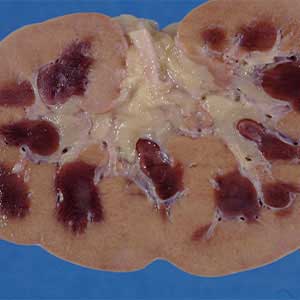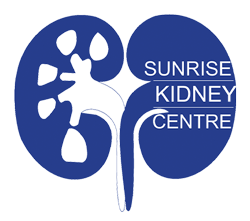Acute Kidney Failure treatment in Vijayawada
Acute kidney failure, also known as acute kidney injury (AKI), is a sudden and often reversible decline in kidney function that occurs within hours to days, impairing the kidneys' capacity to remove waste materials, surplus fluids, and electrolytes from the bloodstream. This condition can result from various factors such as severe dehydration, blood loss, infections, or exposure to nephrotoxic substances like certain medications or toxins. When the kidneys fail acutely, waste products like urea and creatinine accumulate in the bloodstream, leading to symptoms such as swelling, fatigue, confusion, and decreased urine output. AKI can be classified into prerenal, intrinsic, and postrenal causes, depending on whether the problem originates before, within, or after the kidneys. Prompt diagnosis and treatment are crucial to prevent progression to chronic kidney disease or irreversible damage, often involving addressing the underlying cause, maintaining fluid and electrolyte balance, and, in severe cases, renal replacement therapy such as dialysis. Despite its sudden onset, the potential for recovery makes early intervention vital, emphasizing the importance of monitoring at-risk populations, including hospitalized patients and those with pre-existing health conditions.

Factors contributing to AKD?
Acute kidney failure, also known as acute renal failure, can result from a variety of causes, often categorized into prerenal, intrinsic, and postrenal factors. Prerenal causes stem from decreased blood flow to the kidneys, such as severe dehydration, heart failure, or shock, leading to inadequate perfusion. Intrinsic causes involve direct damage to the renal parenchyma, including conditions like acute tubular necrosis from ischemia or nephrotoxic drugs (such as aminoglycosides or contrast agents), and glomerulonephritis. Postrenal causes are due to obstructions in the urinary outflow tract, such as kidney stones, tumors, or benign prostatic hypertrophy, which elevate pressure within the renal system and impair filtration. Additionally, systemic infections, autoimmune diseases, and severe trauma can trigger inflammatory responses or direct injury to renal tissues. Understanding these diverse etiologies is crucial for prompt diagnosis and targeted intervention by an acute renal failure specialist to prevent irreversible kidney damage.
Identifying the symptoms of AKD
Acute kidney failure, also known as acute kidney injury (AKI), manifests through a variety of symptoms that often develop rapidly. Patients may experience a sudden decrease in urine output, resulting in dark, foamy, or bloody urine, alongside swelling in the legs, ankles, or around the eyes due to fluid retention. Fatigue and weakness are common, stemming from the accumulation of waste products like urea and creatinine in the blood, leading to nausea, vomiting, and a diminished appetite. Some individuals might develop shortness of breath or chest pain, especially if fluid overload affects the lungs. Confusion or decreased alertness can occur as toxins build up, impacting brain function. Additionally, high blood pressure may be observed, and in severe cases, there can be signs of electrolyte imbalances such as irregular heartbeat or muscle weakness. Recognizing these symptoms early is crucial for prompt nephrology care in Vijayawada and preventing long-term kidney damage.
How to prevent AKD?
Preventing acute kidney failure involves a multifaceted approach centered on lifestyle modifications, medical management, and early intervention. Maintaining adequate hydration is crucial, especially during illnesses or intense physical activity, to prevent dehydration-induced kidney stress. Managing chronic conditions such as diabetes and hypertension through proper medication, diet, and regular monitoring reduces the risk of kidney damage. Avoiding nephrotoxic substances, including excessive use of NSAIDs and certain antibiotics, is essential; always consult healthcare providers before starting new medications. Ensuring safe practices during surgeries or contrast dye procedures involves pre-procedure hydration and using the lowest effective dye doses. Adopting a balanced diet low in processed foods and high in antioxidants supports overall kidney health. Regular health screenings at Sunrise Kidney Centre which is one of the best kidney hospital in Vijayawada can detect early signs of kidney impairment, allowing timely intervention. Educating oneself about symptoms of kidney issues and seeking prompt medical attention for infections or unexplained illnesses can prevent escalation to acute failure. Collectively, these strategies foster kidney resilience and reduce the incidence of acute kidney failure.
Clinical Treatment and Management of AKD
Acute kidney failure treatment in Vijayawada focuses on rapid identification, stabilization, and addressing underlying causes. Initial treatment involves maintaining hemodynamic stability through careful fluid management—either judicious fluid resuscitation in hypovolemia or diuretics in fluid overload—while avoiding volume depletion. Electrolyte imbalances, particularly hyperkalemia, must be promptly corrected using agents such as calcium gluconate, insulin with glucose, or sodium bicarbonate. Renal replacement therapy (RRT), including hemodialysis or continuous renal replacement therapy (CRRT), is initiated when there are indications like severe acidosis, persistent hyperkalemia, fluid overload unresponsive to diuretics, or uremic symptoms. Nutritional support emphasizes adequate caloric intake with restricted protein to minimize azotemia. Close monitoring of urine output, serum creatinine, blood urea nitrogen, and electrolytes guides ongoing treatment adjustments. According to Dr. M.V. Sai Krishna one of the leading nephrology specialist in Vijayawada addressing precipitating factors such as sepsis, hypotension, nephrotoxic drugs is crucial for recovery, and multidisciplinary care involving nephrologists, intensivists, and nutritionists enhances patient outcomes.

